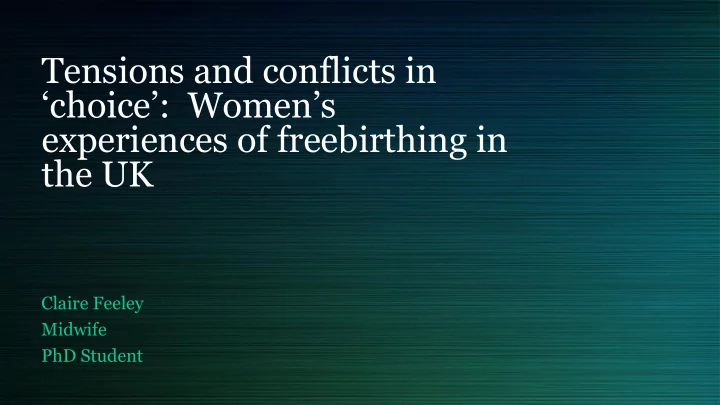

Tensions and conflicts in ‘choice’: Women’s experiences of freebirthing in the UK Claire Feeley Midwife PhD Student
What is freebirthing? Image by Shutterstock
Context: Why do some women choose to freebirth? • A previous birth trauma-later compounded by another experience of poor maternity care • Desire to minimize disturbance for a safer birth • Positive decision involving the rejection of midwifery and medical models of care
The obstructive behaviour by the community midwives, the lottery of who would turn up at the birth. If their behaviour was indicative of many of the midwives in the Trust then I could not trust that they were supportive of home births. I actually became fearful that they would turn up in time for the birth as they seemed more scared of attending a home birth than I felt about having a home birth.’ (Cat)
What were the women’s experiences? Tactical planning Unfit to Violation be a of rights mother Faced opposition, conflict and negative reprisals
Violation of rights ‘She informed me, incorrectly of course, that it was illegal’ ‘met with suspicion and prejudice’ ‘ a horrible experience ’ ‘harassment’ ‘angry’
Not being willing to engage with health services at every point they want you to is not necessarily a precursor to putting your child at risk, and they need to learn to make that distinction better. (Claire, narrative)
Tactical planning • Associated with fear of being referred to social services • Fears of retribution created iatrogenic harm • Used to mitigate the tensions in their freebirth decision and the attitudes of their midwives
So we made the decision to have the baby on our own and call out the midwife afterwards and just pretend it happened so quickly they didn't get there in time. Or not that they didn't get there on time, but we didn't have time to ring before. (Jane, interview).
Unfit to be a mother • FOUR women referred to social services • Two women had police attendance • Two women had the cases resolved immediately • Accused of neglect and ‘unfit to be a mother’
• ‘profoundly affected my transition to motherhood, leaving a lingering imprint ’ • ‘ stressful’ • ‘terrifying’ • ‘threatening’
Then that evening about seven o'clock social worker came again with two police officers, you know looking out of the window with two police officers on your door step, I've got a 7 day old baby and a three year old daughter, and I just had no idea why these people were in our lives. I was absolutely terrified, and um, my husband answered the door and they said they wanted to a welfare check. (Alex, interview).
Key points for midwives • Understand women’s legal rights • Understand the boundaries of our professional obligations • You are accountable for your *care* not women’s decisions • Coercion is not an option • Freebirthing on its own is not a safeguarding referral • Keep communication open, non-judgmental and supportive
For more information • Email me! clfeeley@uclan.ac.uk • https://www.researchgate.net/profile/Claire_Feeley • http://www.birthrights.org.uk/ • Final thought: ‘It is important to recognise that ethical and legal issues - such as autonomy, bodily integrity and the right to choose - are central to the care that midwives provide, and not solely concerned with women who freebirth .’ (Feeley and Thomson, 2016)
Recommend
More recommend